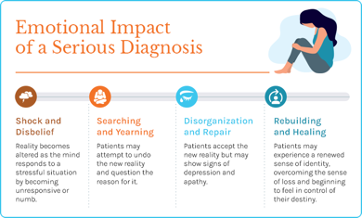The Emotional Burden of Disease and the Impact of Patient Engagement

Sponsored by VMS BioMarketing
Biopharma companies offer many forms of support when a patient’s therapy is initiated. However, substantial research indicates that people with rare or complex conditions require a more intensive level of support that includes addressing the emotional needs related to their condition.
Patients’ Emotional Burdens
The emotional impact of disease is a reality every patient faces – especially those who suffer with rare or complex conditions. The biopharma industry should be prepared to offer support considering the pervasive nature of stress and distress:
- 32% of adults have reported symptoms of anxiety and/or depressive disorder related to the COVID-19 pandemic.1
- 20% of patients with early-stage cancer and 80% with recurrent cancer experience symptoms of PTSD.2
- Psychological stress is estimated to be associated with a 40% to 60% excess risk of coronary heart disease.3
- 33% to 50% of people with diabetes experience distress.4
- 90% of people with rare diseases reported they had felt anxious, stressed, or depressed.5
Emotional Impact and the Patient’s Personal Journey
Many people are familiar with Dr. Elizabeth Kubler-Ross’s model of emotional impact for death and dying introduced in 1969. Since then, additional paradigms have been developed, including this helpful model by British psychologists Bowlby and Parkes.6

Industry-provided patient engagement solutions are recommended that can address the clinical and non-clinical needs:
- Information about the diagnosis
This helps patients and caregivers better understand the disease and treatment, promotes follow-up questions and concerns, and encourages therapy adherence. - Problem-solving strategies
Provided in a supportive environment, this can help patients work through grief, fear, and other emotions. - Patient support groups
Leading and/or referring patients and caregivers to such groups gives them an opportunity to give and receive emotional support, as well as learn from others’ experiences. - HCP care team collaboration
Open channels between the HCP care team and the patient engagement program help patients communicate more effectively, and it ensures care coordination with all health care providers.
These all overlap in that they strive to elevate the patient journey. Less complication in the care process, for example, means fewer stress points for patients. Access to support groups can provide peace of mind and opens a constructive path and effective outlet for patients to deal with the emotional impact of their disease.
The Role of Nurse Support

Healthcare professionals such as Nurse Navigators can provide digital and in-person patient support, coaching, and navigation from the time of prescription onward. They assist with therapy management to personalize the journey based on patient needs, barriers, and learning style. They are both an extension of and ambassadors from the patient engagement program.
The Nurse Navigator, as a primary point of multi-channel contact, communicates and coordinates with HCP teams and other constituencies within the therapy process. They are a continuous go-to resource for patients, which is important for both medication adherence and to relieve patients from some of the stress of the care process.
Engagement happens in a progressive manner when Nurse Navigators are available to the patient through each stage of the journey via both digital and live support. Because of this, they recognize needs, wants, preferences, and the importance of behavior change in order for patients to receive the full benefit of therapy. They engage the patient as well as caregivers by providing information, problem-solving strategies, referrals to support groups, and collaboration with the health care provider team.
Good for Patients, Good for All
Emotional support is part of a holistic model for patient engagement, and the biopharma industry should be prepared to act to the extent possible to provide personalized programs with both digital and live support. Quality patient engagement is a positive factor in patient adherence and therapy outcomes. A more intensive level of patient engagement establishes pharma companies as more than makers of medication; it creates a positive and trusting relationship between patients and the brand.
Learn about this topic and more at www.vmsbiomarketing.com.
1 Kaiser
2 NCI
3 American Journal of Medicine
5 CSL





